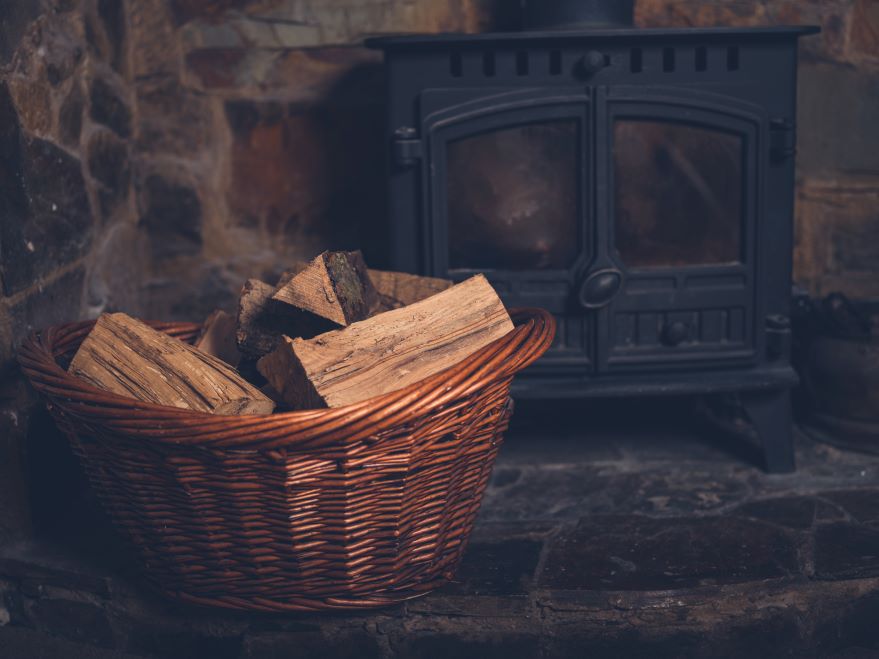Could your log burner earn you a fine this winter?

As winter settles in and the cold snap begins, staying warm becomes a top priority for many. With energy prices soaring in recent years, we’re all looking to find cost-effective ways to heat our homes. Alternative heating methods like log burners have grown in popularity. These rustic stoves offer a cosy ambiance and potential savings, but they also come with a range of regulations, and ignoring them could land you a hefty fine this winter.
So, what do you need to know about using a log burner in your home? Let’s explore the appeal, the risks, and the rules you should consider before buying one for your home.
Log burners: what’s the appeal?
Log burners have become really popular in recent years. There’s a range of benefits, making them an attractive heating option for many people. One of the key advantages is their energy efficiency. Unlike traditional open fireplaces, which allow a lot of heat to escape, log burners are designed to produce more heat while burning fuel more completely. This efficiency means that a well-installed log burner can warm a room much more effectively than an open fire.
For some, log burners can result in lower heating costs. In some areas, particularly where wood is readily available, it can be a cheaper fuel source compared to gas or electricity. This makes log burners a cost-effective solution for heating, especially during cold winter months when energy bills tend to spike. And if you live in a rural or remote location, log burners can be a practical solution for off-grid heating.
Then of course, there’s the aesthetic appeal of a log burner. With a cosy, rustic charm, a log burner can act as a focal point in living spaces, creating a warm and inviting atmosphere. The crackling sounds, gentle flicker of flames and smell of burning wood all create a relaxing and comforting environment – perfect for when it’s miserable outside and you just want to curl up indoors!
Will I be fined for having log burner at home?
All this sounds good on paper. But you should also consider some of the rules and risks that come with log burners before you take the plunge and purchase one for your home. In the UK, there are several regulations around installing and using log burners (wood-burning stoves) at home. These are in place for your own safety, for others’ safety and the environment’s.
Burning wood contributes to outdoor air pollution, particularly in urban areas. Many areas in the UK are designated Smoke Control Areas, where only DEFRA-approved stoves can be used to minimise pollution.
If you live in a Smoke Control Area, you can only burn authorised fuels, such as certain types of wood or smokeless fuel. Otherwise, only DEFRA-approved stoves are allowed to burn untreated wood. If you burn unauthorized fuel in a non-DEFRA approved stove in a Smoke Control Area, you may face a fine of up to £1,000!
If your home is a listed building or located in a conservation area, you may need additional permission from your local council to install a log burner. Changes to chimneys or external walls (for flues) in these areas may require planning permission. For most homes, however, installing a stove does not require planning permission if the building and chimney/flue meet general regulations.
What other risks or rules are there around log burners?
Before you opt for a log burner, consider if you or anyone you live with has existing respiratory issues. Wood smoke contains particulates and other pollutants, and while it should be installed safely, a log burner can reduce indoor air quality, especially for people with asthma or other lung conditions.
Since 2022, all newly sold wood-burning stoves in the UK must comply with EcoDesign regulations, which set limits on the gas and particulate emissions. It’s worth noting that if you’re on the hunt for a bargain or buying a used log burner, you should check that it’s still compliant.
Once you’ve bought your log burner, it’s important you ensure that you either use a HETAS-registered installer (the official body for solid fuel appliances in the UK) or have your local building control department approve the installation. A HETAS-registered installer will issue Certificate of Compliance certifying that the installation complies with building regulations. This is important for safety, insurance, and when selling your home.
An expert, certified installer will also ensure that your log burner is installed a safe distance from combustible materials, such as furniture, and connected to a proper chimney or flue system. Your log burner must also be installed on a non-combustible hearth that is the right size for how hot it gets.
This is all to allow adequate ventilation, to avoid dangerous carbon monoxide levels, and to prevent fire hazards. You should have a carbon monoxide detector in your home already, but you must also have one in the same room as a log burner.
And, once your log burner is installed you need to make sure you’re using the right fuel and storing it properly. Not only is wet or unproperly seasoned wood (moisture content below 20%) inefficient for burning, but it produces more emissions. Only buy wood from a reputable source, that you know meets this requirement and store it in a dry, well-ventilated area. You must also maintain your log burner and chimney with a chimney sweep at least once a year.

Should you tell your insurer about your log burner?
In short, yes! Installing a log burner can affect your home insurance coverage. Some insurers may see it as an increased risk of fire or damage and could adjust your policy or even refuse coverage if they are not informed beforehand.
You may find your premium increases because a log burner is considered a higher fire risk compared to standard heating systems. On the other hand, if your log burner is installed correctly, and you have adequate safety measures (e.g., a smoke alarm, fire-resistant materials, carbon monoxide detectors), some insurers may not increase premiums or may even offer discounts for safety compliance.
That’s why it’s vital you have your log burner installed by a qualified professional. Insurers may request a Certificate of Compliance to confirm that the stove was installed correctly and adheres to building regulations. This certificate provides proof that the stove is safe and reduces the risk of accidents that could lead to insurance claims.
Log burners carry a higher risk of house fires, especially if they are not installed, maintained, or used properly. Insurers may require you to meet specific safety requirements (such as regular chimney sweeps or the installation of a fire-resistant hearth) to reduce fire risks. Some insurers may insist that a carbon monoxide detector, which is required as we explained above.
Failing to notify your insurer about your log burner installation could invalidate your policy in the event of a claim. If you have a log burner installed, don’t mention it to your insurer and then there is a fire or carbon monoxide incident, your claim could be denied. Insurers can argue that the increased risk was not disclosed, leaving you without coverage for potentially significant damages or losses.
Find your nearest Howden Insurance branch
When it comes to installing a log burner, it’s crucial to be aware of all the risks and regulations—especially when it comes to your home insurance. Not informing your insurer could lead to serious consequences, including invalidating your policy. To ensure you’re covered and that your installation is compliant, it’s a good idea to seek advice from an expert.
For any insurance-related concerns or questions about how a log burner might impact your policy, get in touch with your local Howden Insurance branch. Our experts can discuss your concerns and queries, as well as helping you find cover.
Search Howden Insurance, and find your local branch here.
Sources: Yorkshire Live, Daily Express
This is a marketing blog by Howden.



